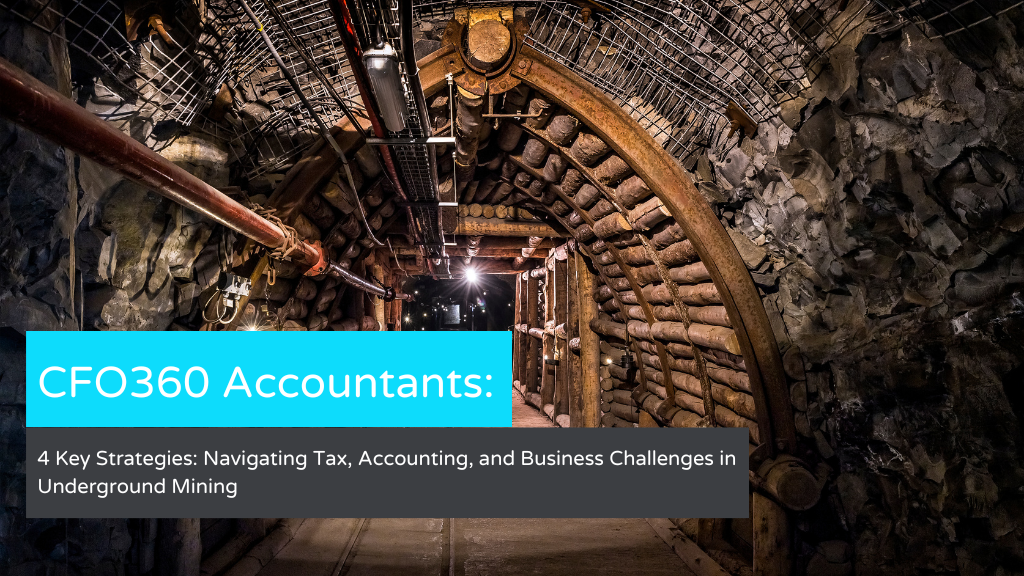As one navigates the labyrinthine tunnels of the UK’s underground mining industry, it’s evident that unearthing valuable resources isn’t merely about geological prowess. Rather, it’s a sophisticated dance that intertwines geological expertise with astute business acumen, meticulous accounting practices, and a deep understanding of the tax landscape. This comprehensive guide shines a light on these crucial elements. We’ll delve into the top 5 business strategies that can help your mining venture strike gold, discuss accounting practices that can keep your operation rock-solid, and unravel tax complexities unique to the industry. Let’s embark on this journey to the heart of underground mining’s financial core.
- Business Tips for Underground Mining
- Accounting Tips for Underground Mining
- Tax Tips for Underground Mining
- Bookkeeping Tips for Underground Mining
- Conclusion
Business Tips for Underground Mining
Regulatory Compliance: The mining sector is heavily regulated. Ensure you’re familiar with and comply with all relevant health, safety, and environmental regulations.
Investment in Technology: Modern mining technology can significantly boost productivity and safety. Regularly assess whether your operation could benefit from new equipment or software.
Risk Management: Identify potential operational, financial, and market risks and develop mitigation strategies.
Market Analysis: Keep a close eye on the market prices of the minerals you extract and adjust your strategy accordingly.
Sustainability: Adopting sustainable mining practices can improve your company’s reputation and help ensure its long-term viability.
Workforce Training: Regularly train your workforce to maintain high safety standards and improve efficiency.
Strong Financial Management: Robust accounting and bookkeeping practices are key to understanding your operation’s financial health and making informed business decisions.
Community Relations: Building good relationships with local communities can lead to smoother operations and help avoid potential disputes.
Accounting Tips for Underground Mining
Use Industry-Specific Software: Consider using accounting software designed specifically for the mining industry. This can help streamline processes such as cost tracking and financial reporting.
Monitor Capital Expenses: Keep meticulous records of capital expenditures. These include machinery, equipment, and infrastructure costs, which can have significant tax implications.
Manage Inventory: Effective inventory management is crucial. Regularly audit your physical assets and ensure they match your recorded inventory.
Account for Depreciation: The heavy machinery used in mining depreciates over time. Accurately tracking this depreciation is vital for internal financial analysis and tax reporting.
Record Restoration Provisions: Mining companies are typically required to restore sites after use. Make sure to estimate and record these future costs accurately.
Track Revenue Accurately: Revenue recognition in mining can be complex. Ensure you’re accurately tracking when revenue is earned and recognizing it in your financial statements.
Professional Help: Given the industry-specific challenges, consider enlisting a professional accountant familiar with mining. They can ensure your practices are accurate, efficient, and compliant with regulations.
Tax Tips for Underground Mining
Understand Capital Allowances: Mining operations typically involve heavy machinery and equipment, for which capital allowances can be claimed to reduce taxable profits.
Research and Development (R&D) Tax Credits: If your operation is involved in developing new mining techniques or technologies, it may qualify for R&D tax credits.
Ring Fence Expenditure Supplement (RFES): RFES can be claimed by companies making significant investments in exploration and appraisal and can be used to enhance losses.
Consider Decommissioning Relief: Mining companies often must restore mining sites after use. Decommissioning relief can be claimed for these costs, reducing the tax burden.
Handle VAT Correctly: Ensure you’re charging the correct VAT on your sales and reclaiming VAT on eligible purchases.
International Taxation: Understand the international tax implications if your operation extends beyond the UK.
Loss Relief: If your operation loses, you can carry this loss forward against future profits.
Professional Help: Given the complexity of tax regulations in mining, it can be beneficial to enlist a tax professional familiar with the industry.
Bookkeeping Tips for Underground Mining
Leverage Mining-Specific Software: Specialized bookkeeping software can provide industry-tailored features that simplify and streamline recording income and expenses.
Document Every Transaction: No matter how small, record all financial transactions. This habit ensures you can account for all income and expenses, contributing to more accurate financial reporting.
Monitor Asset Depreciation: Heavy machinery and equipment depreciate over time. Consistently track this depreciation to accurately reflect your assets’ value accurately and for tax purposes.
Maintain Inventory Records: Regularly update your inventory records, including raw materials, supplies, and machinery parts. Sudden discrepancies can be a sign of theft or mismanagement.
Track Labour Costs: Labour often accounts for a significant portion of mining costs. Accurately record salaries, benefits, and overtime payments.
Set Aside Funds for Site Restoration: You must usually restore your mining site once operations end. Accurately account for these anticipated costs in your financial records.
Regularly Reconcile Your Books: Cross-check your financial records with bank statements to identify and correct any discrepancies.
Consider Professional Assistance: If bookkeeping becomes too time-consuming or complex, hire a professional. They can help ensure accurate, timely records, leaving you more time to focus on other aspects of your business.
In conclusion, underground mining in the UK has played a significant role in shaping the nation’s industrial heritage and extracting valuable resources from beneath the surface. Despite its historical significance, modern underground mining faces challenges such as safety, environmental impact, and economic viability. As the UK moves towards sustainable practices and renewable energy sources, it is crucial for the mining industry to adapt and find innovative solutions. Balancing the need for resource extraction with responsible environmental stewardship will be the key to ensuring a prosperous and sustainable future for underground mining in the UK.









